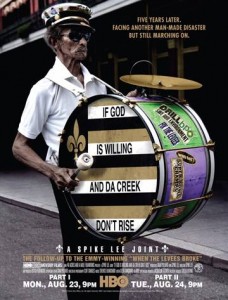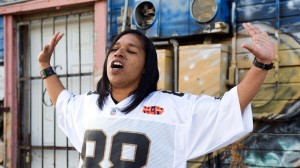 “We’re not really part of the United States,” WWL’s Garland Robinette says. “We’re like a rich Haiti.” That feeling of alienation is an undercurrent that runs through Spike Lee’s new documentary for HBO, If God is Willing and Da Creek Don’t Rise, which presents Robinette and people from most walks of life in an account of continuing efforts to recover after Hurricane Katrina. On Tuesday night at the Mahalia Jackson Theatre for the Performing Arts, HBO premiered hours one and four of the four-hour documentary, which debuts on television Monday and Tuesday nights. At the New Orleans Arena premiere of Lee’s When the Levees Broke in 2006, he screened all four hours in an exhausting marathon. “We’re not doing that again,” he said good-naturedly Tuesday night before the film.
“We’re not really part of the United States,” WWL’s Garland Robinette says. “We’re like a rich Haiti.” That feeling of alienation is an undercurrent that runs through Spike Lee’s new documentary for HBO, If God is Willing and Da Creek Don’t Rise, which presents Robinette and people from most walks of life in an account of continuing efforts to recover after Hurricane Katrina. On Tuesday night at the Mahalia Jackson Theatre for the Performing Arts, HBO premiered hours one and four of the four-hour documentary, which debuts on television Monday and Tuesday nights. At the New Orleans Arena premiere of Lee’s When the Levees Broke in 2006, he screened all four hours in an exhausting marathon. “We’re not doing that again,” he said good-naturedly Tuesday night before the film.
While When the Levees Broke followed the chronology of events starting with the events leading up to Hurricane Katrina’s landfall and the subsequent flooding, If God Is Willing … moves more eccentrically, touching on the Saints’ in the Super Bowl, New Orleanians in Houston, the closing of the housing projects, and Ray Nagin, all within an hour. Lee makes these leaps across time and subject matter cohere, largely on the strength of the personalities of the people he interviews. Lee routinely gets lively interviews from his subjects, which translates to both information and a sense of the texture of life. Mayor Mitch Landrieu is surprisingly frank, and one Treme evacuee in Houston speaks hilariously about his courtship of his relief worker wife.
 The first hour starts with a monologue by Phyllis Montana-Leblanc, a montage of destruction dotted with survivors today, then rolls into the Super Bowl, which remains moving today. Even in that passage, though, there is an undercurrent that forces outside of New Orleans could jerk this away too – a point underscored throughout by a Katrina-hardened Douglas Brinkley – and it’s illustrated in the last hour, which focuses on the BP oil spill and the extreme lack of urgency and candor the company brought to its clean-up efforts.
The first hour starts with a monologue by Phyllis Montana-Leblanc, a montage of destruction dotted with survivors today, then rolls into the Super Bowl, which remains moving today. Even in that passage, though, there is an undercurrent that forces outside of New Orleans could jerk this away too – a point underscored throughout by a Katrina-hardened Douglas Brinkley – and it’s illustrated in the last hour, which focuses on the BP oil spill and the extreme lack of urgency and candor the company brought to its clean-up efforts.
When Lee premiered When the Levees Broke, it was often cathartic as a community of 14,000 came together to experience the anguish and rage related to Katrina and the subsequent destruction. Tuesday’s mood was closer to one of home movie night, with pockets of the crowd cheering for people they knew when the appeared on screen. Landrieu got a lot of love, as did Anderson Cooper, Billy Nungesser, Jeremy Shockey (more than Drew Brees and Reggie Bush) and Sean Payton, while President Bush, Vice President Cheney and Michael Brown still earn boos and curses. Nagin’s appearances were met with laughs.
One thing If God Is Willing … demonstrates is the remarkable gravity exerted by Katrina. Lee has already spent four hours of documentary time on Katrina, but he once again returns to destruction to open the new film and in the end of the last hour, returns to a montage of bodies dead in the floodwaters (echoing a similar montage in When the Levees Broke), and though destruction remains evident and the story has moved forward, images of the barge aground in the Lower Ninth Ward have a pull that Lee can’t resist. Terence Blanchard’s soundtrack often seems similarly plugged into the stately, mournful mood of When the Levees Broke, even though speakers in the movie talk about the city being in a precarious place where it could genuinely move forward or fall back into its older, dysfunctional ways.
They’re hardly alone in this, though. Other Katrina-related projects similarly find the magnitude and intensity of post-Katrina destruction irresistible, even if it’s not exactly representative of the stories they’re telling. Here, it’s a minor but sensational element in a film that otherwise deals well with the complicated issues involved with rebuilding a major American city.




